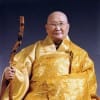Becoming Human
Zen Master Seung Sahn
- The Kwan Um School of Zen is an international organization of Zen centers and groups founded under the direction of the Korean Zen Master Seung Sahn.Zen Master Seung Sahn first traveled to the West in 1972, and met his first Western students in Providence Rhode Island, in the United States, where he established the first Zen center, Providence Zen Center.
- A major figure in the transmission of Zen to the West, Zen Master Seung Sahn was known for his powerful teaching style, which was direct, surprising, and often humorous. He taught that Zen is not about achieving a goal, but about acting spontaneously from 'don’t-know mind.'
 Zen Master Seung Sahn
Zen Master Seung Sahn Zen Master Seung Sahn Haeng Won Sunim (Dae Soen Sa Nim) was the first Korean Zen master to teach in the West. He was born in 1927 in south Pyeong An Province in what is now North Korea. After World War II and Korea’s liberation from Japanese occupation, he was disillusioned with politics and academic studies as a way to attain truth.

If you look closely at human beings in the world today, you notice that they are not human beings. They don't act like human beings. If a human being acts correctly, then he or she becomes a true human being. Moment to moment, what do you do? What is your correct direction? Moment to moment, what is your correct life? How do you find your correct way? How do you save all beings from suffering?
Seung Sahn Quotes
We come into this world empty-handed. What do we do in this world? Why did we come into this world? This body is an empty thing. What is the one thing that carries this body around? Where did it come from? You must understand that, you must find that. So, if you want to find that, you have to ask yourself, 'What am I?' Always keep this big question. Thinking has to disappear. We have to take away all our thinking, cut off our thinking. Then our true self appears, then our true mind appears...Seung Sahn Soen-sa
In this world, how many people really want practice? Many people don't practice at all, fight day and night, and all day exercise their desire, their anger, their ignorance. When you lose this body, then you have nothing you can take with you. When this body disappears, what will you take with you? What will you do? Where will you go? You don't know, right? If this 'don't know' is clear, then your mind is clear, then also the place you go is clear. Then you understand your job, you understand why you were born into this world. Then you understand what you do in this world. When you understand that, then you can become a human being.Seung Sahn Scandal
The Kwan Um School of Zen is an international organization of Zen centers and groups founded under the direction of the Korean Zen Master Seung Sahn. Zen Master Seung Sahn first traveled to the West in 1972, and met his first Western students in Providence Rhode Island, in the United States, where he established the first Zen center, Providence Zen Center. Soon, more Zen centers were created on both coasts and in the midwest. In 1978, Zen Master Seung Sahn began traveling to Europe and new Zen centers quickly appeared in many countries including Spain, Poland and Germany. He also regularly visited Hong Kong, Singapore and Malaysia, establishing new Zen centers in Asia outside of Korea. Zen Master Seung Sahn introduced many Western students to the traditional 90-day intensive Zen retreats known as “Kyol Che,” which has been a central aspect of Korean Zen practice for monks and nuns for over 1,000 years. Today, Kyol Ches are held each year in summer and winter at designated Zen centers in North America, Europe and Asia, where monks, nuns, laymen and laywomen can all practice Zen together. Over the years, more centers and groups were founded around the world, and in 1983, this growth led to the formal organization of the Kwan Um School of Zen, with the purpose of providing cohesion and administrative support to all of its centers. Kwan Um means “perceive world sound,” to hear the suffering sounds of the universe and offer help. Today, the international Kwan Um School of Zen has more than a hundred centers and groups and over 40 authorized Zen masters (Soen Sa’s) and Dharma masters (Ji Do Poep Sa’s) who teach in more than 12 languages. Kwan Um Zen centers provide scheduled meditation practice sessions, public talks and retreats that are open to all who wish to practice Zen. The School also provides Dharma Teacher training for lay practitioners, and residential training and monastic training at designated centers. There are three main administrative regions within the organization: the Americas, Europe, and Asia. | Everybody says, 'I' - 'I want this, I am like that...' But nobody understands this 'I.' Before you were born, where did your I come from? When you die, where will your I go? If you sincerely ask, 'what am I?' sooner or later you will run into a wall where all thinking is cut off. We call this 'don't know.' Zen is keeping this 'don't know' mind always and everywhere. When walking, standing, sitting, lying down, speaking, being silent, moving, being still. At all times, in all places, without interruption - what is this? One mind is infinite kalpas.Meditation in Zen means keeping don't-know mind when bowing, chanting and sitting Zen. This is formal Zen practice. And when doing something, just do it. When driving, just drive; when eating, just eat; when working, just work. Finally, your don't-know mind will become clear. Then you can see the sky, only blue. You can see the tree, only green. Your mind is like a clear mirror. Red comes, the mirror is red; white comes the mirror is white. A hungry person comes, you can give him food; a thirsty person comes, you can give her something to drink. There is no desire for myself, only for all beings. That mind is already enlightenment, what we call Great Love, Great Compassion, the Great Bodhisattva Way. It's very simple, not difficult! So Buddha said that all beings have Buddha-nature (enlightenment nature). But Zen Master Joju said that a dog has no Buddha-nature. Which one is right? Which one is wrong? If you find that, you find the true way. |

